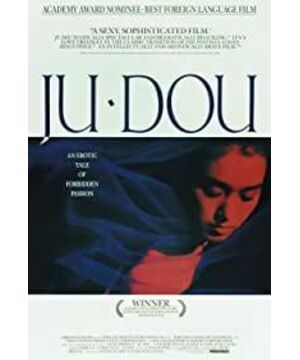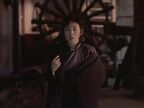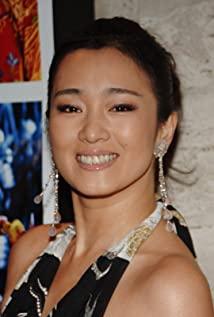Ostensibly, Judou (Yimou Zhang, 1990) criticizes feudalism and sympathizes with women's status specific to traditional society. In Judou, Yimou Zhang depicts an attractive woman's adulterous and consequently tragic life within a feudalistic environment. While these themes are akin to those of Zhang's predecessors, Judou sheds light on strictures relevant to Chinese contemporary society. While some Western audiences misread Judou due to their unfamiliarity with the cultural context, Chinese audiences also mistake the film as a criticism of China's feudalistic past. Judou's messages about filial piety portrayed through exotic customs are still valid for contemporary Chinese identity and family values.
Communist indoctrination of the 20th century was embedded in cultural forms such as songs, plays and films. While the formerly dominant Socialist Realist forms of Chinese cinema soon lost out to foreign cultural substitutes after China's Open Door policy in 1979, the Chinese audience of 1990 has yet to fully adjust and still lacked appreciation for films with complex themes such as Judou. These audiences still try to find higher ideological themes within Judou. Unlike typical Socialist Realist characters, neither the heroine Judou nor the hero Tienqing is transformed by a just, Communist revolutionary cause into a better moral character. Both characters retain their flaws at the end of the film: even though Judou rebels against the patriarchal order, she still depends on men, Tienqing and Tienbai, to fulfill her desires, and Tienqing,despite his passions, never denounces the patriarchal order and sometimes protects it from Judou's verbal attacks. Chinese audiences who struggle during this ideology-seeking film analysis become aware that overarching, Social Realist explanations oversimplify Judou's message. As film critic Jenny Lau points out, Zhang's film is not simply “a tragedy of feudalistic marriage.” 1 Some audiences are appalled by Judou's seduction of her Tienqing. Others are confused by the role of Tienbai, who is arguably responsible for the deaths of both Tienqing and Jinshan.As film critic Jenny Lau points out, Zhang's film is not simply “a tragedy of feudalistic marriage.” 1 Some audiences are appalled by Judou's seduction of her Tienqing. Others are confused by the role of Tienbai, who is arguably responsible for the deaths of both Tienqing and Jinshan.As film critic Jenny Lau points out, Zhang's film is not simply “a tragedy of feudalistic marriage.” 1 Some audiences are appalled by Judou's seduction of her Tienqing. Others are confused by the role of Tienbai, who is arguably responsible for the deaths of both Tienqing and Jinshan.
Those disturbed by Judou's lack of positive resolution or clear assignment of blame turn to the director's motives for leaving his characters morally ambiguous. Scholars and audiences criticize Zhang's films for exoticizing Chinese customs and vilifying Chinese and their identity. They point out artificially exaggerated or fictional customs , such as the lantern custom in Raise the Red Lantern (Yimou Zhang, 1991), to illustrate Zhang's intention of depicting Chinese people as “the Other.” In the view of these critics, Zhang is selling Chinese backwardness to pander to Western audiences' feeling of superiority, in order to gain international recognition. The Chinese government agreed with these critics and banned Judou from screening in China for two years for this “defamation.” However,these denunciations of Zhang do not resolve Judou's thematic tension.
To better understand Judou and its meaning for contemporary Chinese identity, one needs a cultural context other than that of traditional Chinese values. Set in the 1920s in rural China, the film is exotic not only for Western audiences, but also for Chinese audiences. Many of Zhang's films are based in his home province of Shaanxi. While Judou's setting is not expressly named, the song that Tienqing and Jinshan sing to Tienbai is popular only in Shaanxi. Furthermore, ring the Cultural Revolution, Chinese people themselves renounced most customs that Westerners consider traditionally “Chinese”. The dramatic funeral parades and large ancestral shrines shown in the film had ceased to exist in urban China. Zhang's audiences, mostly urban,find these customs archaic and feudalistic and feel ashamed that they are being exhibited for Western audiences.
While both Western and Chinese audiences watch unfamiliar customs, one difference sets Western and Chinese audiences apart: Chinese audiences can identify with the family values portrayed in the film such as the importance of filial loyalty, while Western audiences are confused and shocked. In both Judou and in contemporary China, the family is the center of every person's life, rural or urban. In Judou, Jinshan desperately tries to reproduce and is frustrated not only by his impotency but also by failing to fulfill a crucial Confucian duty: he cannot bear a successor.2 Currently, well-off village bachelors continue to buy Vietnamese women for wives in order to avoid a similar fate. While most people do not have ancestral shrines, it is still crucial in rural China to reproduce male descendants and name them according to the inherited,genealogical name-book. Baby boys are strongly preferred over girls, resulting in gender-selective abortions.
Another aspect of filial loyalty in China is the value that “whatever happens at home stays at home.” 3 This tradition, which is still prevalent today, is apparent throughout the film. Jinshan tolerates the adulterous couple's incest and hides it from others. He is not afraid of retribution for possible murderous actions, yet denouncing Judou and Tienqing is unthinkable for Jinshan because it would cause him to lose face in front of neighbors. It is still true today that the Chinese family tends to suppress information even concerning extreme dysfunction; a mentally ill family member is more likely to be locked up rather than sent to a psychiatrist.
The concept of filial loyalty is, in many ways, the undoing of the characters in the film, and is shown through plot and location choice. After Jinshan is paralyzed in an accident, the four characters share a twisted family relationship in their prison-like house. Tienqing and Judou marry secretly in a dinner scene, with audiences inferring the meaning of the occasion from their traditional wedding dresses. Yet Judou still sleeps next to Jinshan and pretends they are a family for the neighbors. The self-contained family is also highlighted by the location Zhang specifically chosen for the filming of Judou. It is “The Order Hall” 4 that contains large shrine and it is not a coincidence that women who originally lived in this village were banned from its grounds. The shrine has only one door,and is depicted as a claustrophobic place through lighting techniques and shooting angles. The Order Hall traps all four of the characters of Judou both physically and metaphorically. Eventually, Judou burns the house down, a symbolic protest against physical as well as patriarchal strictures.
The tragic ending does not intend to educate audiences by denouncing feudalism that was specific to pre-Communist China, but invites them to question patriarchal order that still exists in Chinese families. Zhang explains in an interview that even though his films are based in the past , he does not intend to make historical commentaries but aims to show timeless human truths. 5 Western audiences acknowledge that struggles against the patriarchal order like Judou's are prevalent in most countries, while some Chinese audiences may believe that the tragedy is particular to their own feudalistic and Confucian culture. Subtle, feudalistic aspects of present Chinese society that even the Communist government failed to eradicate are exhibited in the stylized and visible customs of Judou.The film invites Chinese audiences to ask themselves how far they have actually progressed from filial values in the past 70 years.
View more about Ju Dou reviews










